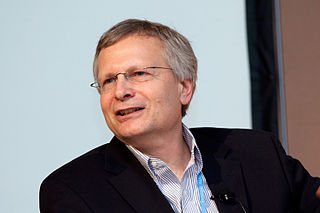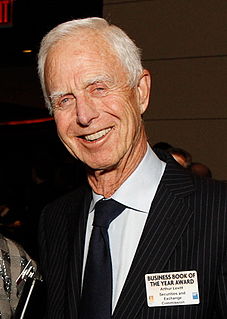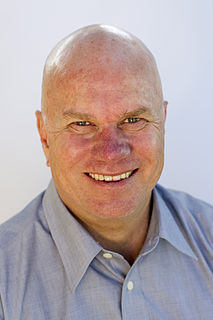A Quote by Malcolm Mclaren
Through all aspects of society be it art, design, the financial markets, government, technology or communications we are witnessing unprecedented global transformation - the result of which is impossible to predict.
Related Quotes
The government can always rescue the markets or interfere with contract law whenever it deems convenient with little or no apparent cost. (Investors believe this now and, worse still, the government believes it as well. We are probably doomed to a lasting legacy of government tampering with financial markets and the economy, which is likely to create the mother of all moral hazards. The government is blissfully unaware of the wisdom of Friedrich Hayek: "The curious task of economics is to demonstrate to men how little they really know about what they imagine they can design.")
The full consequences of a default or even the serious prospect of default by the United States are impossible to predict and awesome to contemplate. Denigration of the full faith and credit of the United States would have substantial effects on the domestic financial markets and on the value of the dollar in exchange markets. The Nation can ill afford to allow such a result. The risks, the cost, the disruptions, and the incalculable damage lead me to but one conclusion: the Senate must pass this legislation before the Congress adjourns.
What’s next for technology and design? A lot less thinking about technology for technology’s sake, and a lot more thinking about design. Art humanizes technology and makes it understandable. Design is needed to make sense of information overload. It is why art and design will rise in importance during this century as we try to make sense of all the possibilities that digital technology now affords.
Unlike national markets, which tend to be supported by domestic regulatory and political institutions, global markets are only 'weakly embedded'. There is no global lender of last resort, no global safety net, and of course, no global democracy. In other words, global markets suffer from weak governance, and are therefore prone to instability, inefficiency, and weak popular legitimacy.
I believe that social change has almost reached critical mass. So many people have undergone personal transformation that their effect on society is having a geometric - not arithmetic - impact. This coalescence of energies brings about meeting, networking, and a sophistication in communications that is unprecedented in history.
When I was in government, the South African economy was growing at 4.5% - 5%. But then came the global financial crisis of 2008/2009, and so the global economy shrunk. That hit South Africa very hard, because then the export markets shrunk, and that includes China, which has become one of the main trade partners with South Africa. Also, the slowdown in the Chinese economy affected South Africa. The result was that during that whole period, South Africa lost something like a million jobs because of external factors.
There is at the global level a very small number of actors who can meaningfully weigh in on global institutional design, who are able - through powerful governments and most effectively through the government of the United States - to exert substantial influence on international negotiations, which are routinely conducted behind closed doors.
Either the Earth System would undergo major phase transitions as a result of unchecked human pressure on nature's capacities and resources or a "Great Transformation" towards global sustainability would be initiated in due course. Neither transitions nor transformations will be manageable without novel forms of global governance and markets.
Through the history of art we can see through the emotional life, and sometimes the financial security of some of the artists, some transformation. And I really believe that it's generally about the same kind of transformation and the same kind of reaction. We are a little bit less individual than we would like to believe or guess we are.
Kyoto is dead and has been dead, but that doesn't mean that it hasn't done some real damage and won't continue to do some real damage," "If global warming turns out to be a problem, which I doubt, it won't be solved by making ourselves poorer through energy rationing." "It will be solved through building resiliency and capability into society and through long-term technological innovation and transformation.




































